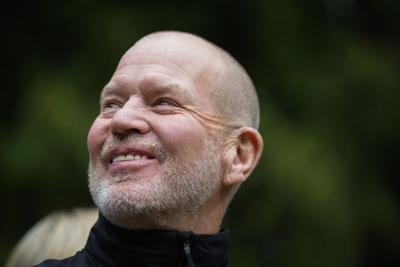The Entrepreneurs is an occasional series that profiles Canadian innovators and the lessons to be drawn from their stories. This week, itÔÇÖs Lululemon founder Chip Wilson.╠ř
When Lululemon first opened its doors in VancouverÔÇÖs Kitsilano neighbourhood in 1998, few believed yoga could anchor a global business.
Investors and industry veterans doubted whether this ancient practice would outlast a passing trend.
Today, yoga studios can draw more visitors than even iconic landmarks. One of us (Sharma) recently saw a yoga class across from LondonÔÇÖs St. PaulÔÇÖs Cathedral outnumber the congregation inside.
For entrepreneurs, yoga is more than a series of poses. ItÔÇÖs a discipline that prepares the body for the mental clarity business demands.
Chip Wilson recognized this. He didnÔÇÖt just launch an athletic brand; he championed a lifestyle that propelled yoga from the fringes to the mainstream.
Another of us (Seeman) has documented how yogic-style reflection now stands among the most effective ways for founders to sustain high performance and resilience.
WilsonÔÇÖs journey, however, also offers a warning as a rare example of a Canadian entrepreneur ousted from the multibillion dollar company he created.
His exit stands as a master-class in how not to leave your own business. The lesson: founders must sense when their company needs professional management to scale, and they should guide that transition, not resist it.
WilsonÔÇÖs early marketing was daring, sometimes divisive.
In 2002, he offered free gear to the first 30 customers who arrived naked at his new Robson Street store in Vancouver ÔÇö a stunt that went viral and won global publicity when marketing budgets were tight. WilsonÔÇÖs bold actions and even his missteps made news, illustrating how a founderÔÇÖs personality can drive or derail success.
What set Wilson apart was his willingness to defy convention. His wife, Shannon, served as chief designer, and he kept manufacturing in Canada while competitors moved offshore. These choices reflected a deeper philosophy: vertical integration as a competitive edge.
Entrepreneurship isnÔÇÖt about executing flawless strategies, write the authors, itÔÇÖs about
Traditional athletic retailers relied on wholesale models, designing products months ahead based on buyer intuition. Wilson rejected that script. Lululemon staff became ÔÇťeducators,ÔÇŁ not salespeople, trained to greet customers within six seconds ÔÇö not just for sales, but for intelligence gathering. Every conversation became data; every fitting room visit, research.
ÔÇťThe real edge wasnÔÇÖt financial ÔÇö it was informational,ÔÇŁ Wilson wrote in his 2018 memoir, “Little Black Stretchy Pants.” This obsession with learning became LululemonÔÇÖs moat, while wholesale-dependent competitors lagged.
WilsonÔÇÖs approach extended to manufacturing. He acquired a 50 per cent stake in a dedicated facility, slashing lead times from 120 days to 60.
Advanced techniques like flat seaming eliminated chafing, while proprietary hot-water prewashes prevented shrinkage. By controlling production, Lululemon could innovate at the molecular level while rivals waited for suppliers.
The results were stunning: LululemonÔÇÖs same-store sales soared 24 per cent annually through its first decade, while traditional retailers struggled with single-digit growth. Gross margins reached 55 per cent, nearly double the industry average.
This philosophy inspired a generation of Canadian retailers. Aritzia, Canada Goose, and Roots boosted their investment in direct customer relationships, transforming stores into community hubs and treating every interaction as fuel for innovation.
Today, while LululemonÔÇÖs market cap has faced headwinds amid broader retail challenges, the companyÔÇÖs fundamentals remain robust.
Revenue continues to climb, international expansion accelerates, and the brand maintains its premium position in a crowded market. The Wilson playbook was no fad; it flourishes worldwide.
In our AI era, WilsonÔÇÖs vertical integration lesson matters considerably. Technology can process vast data, but it cannot replace understanding born from genuine human connection.
The most successful companies will not be those with the best algorithms, but those that combine technological capability with WilsonÔÇÖs continuous feedback philosophy.
ÔÇťWeÔÇÖre not in the business of making clothes,ÔÇŁ Wilson told╠řThe New York Times╠řin 2013. ÔÇťWeÔÇÖre in the business of making people feel good about themselves.ÔÇŁ This customer-centric mindset, paired with operational excellence, forged lasting advantage.
For CanadaÔÇÖs entrepreneurs and business leaders, WilsonÔÇÖs lesson is clear: identify a core group of customers. If youÔÇÖre launching a startup, find potential customers. Ask them not what they want, but what frustrates them. Then build systems to act on those insights immediately.
WilsonÔÇÖs approach offers a blueprint for transforming customer interactions into competitive advantage. Whether youÔÇÖre selling athletic wear or software, the principle is the same: get closer to your customers than anyone else, then use that intimacy to innovate faster than competitors who rely on second-hand research.
LululemonÔÇÖs sweatproof fabric was just the beginning. The real innovation was building a system where every customer conversation fuelled product development, every store visit generated insights, and every interaction strengthened the brandÔÇÖs community.
Wilson may have stumbled in his founder transition, but his core insight is magisterial: in business, proximity to customers is the foundation of a sustainable competitive moat.
For Canadian entrepreneurs building the next generation of global brands, that lesson is as relevant today as it was for that first Kitsilano store.































To join the conversation set a first and last name in your user profile.
Sign in or register for free to join the Conversation